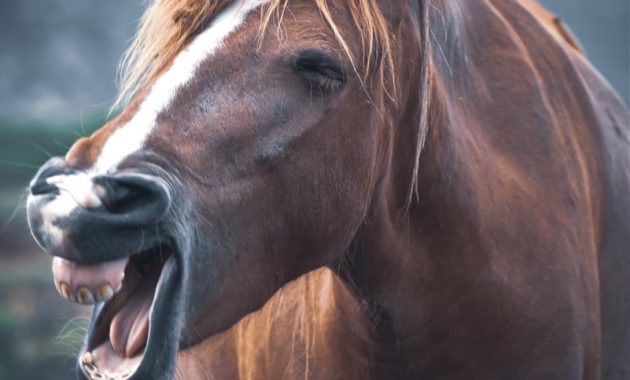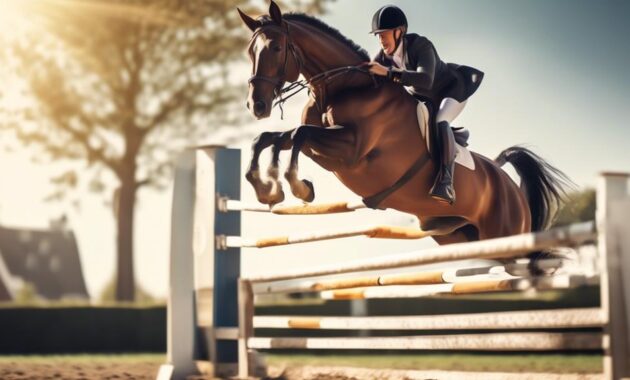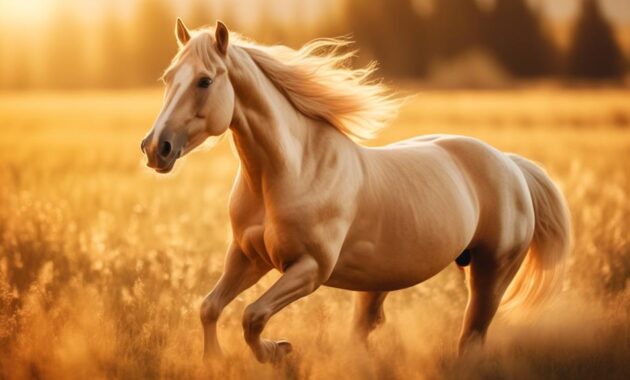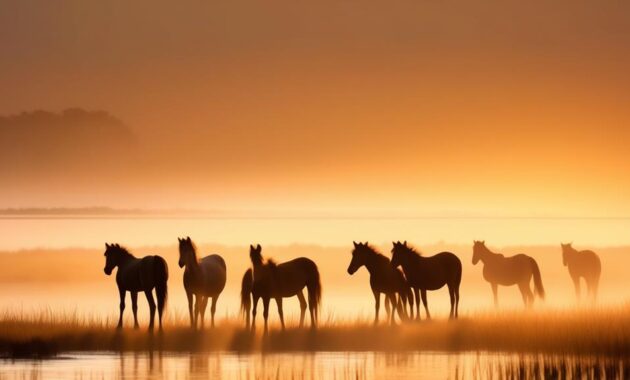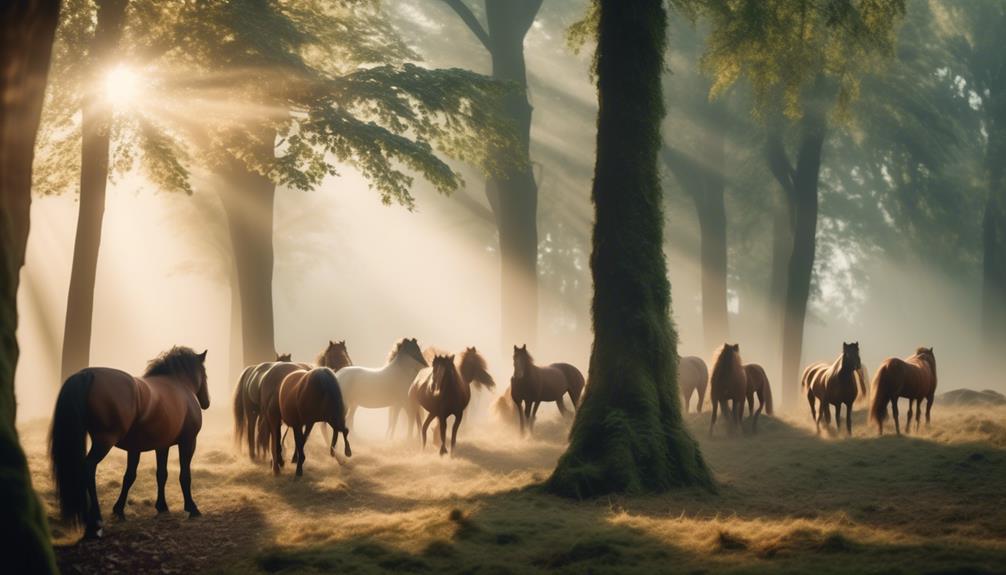
Imagine stumbling upon an ancient artifact, its origins as mysterious as the night sky. It is a puzzle waiting to be solved, a secret yearning to be revealed.
Just like that artifact, the Curly Horse breed captivates with its enigmatic beginnings. As you embark on this journey of discovery, prepare to be amazed by the theories and tales that surround these remarkable equines.
From their potential Russian Bashkir roots to their presence in Asian artwork and the Sioux Indian culture, the Curly Horse's past is a tapestry woven with intrigue and mystery.
But that is just the beginning. As we peel back the layers of their history and unearth their unique traits, you will find yourself drawn deeper into the captivating world of the Curly Horse breed.
So, grab your proverbial shovel and join us as we dig into the depths of their origins, unearthing a story that will leave you yearning for more.
Key Takeaways
- The exact origin of the Curly Horse breed is still unknown, with theories suggesting Russian Bashkir heritage, crossing the Bering Land Bridge, or introduction by Russian settlers.
- Curly horses have been recorded in Asian artwork and were owned by Sioux Indians in the early 1800s, indicating their presence in history.
- The breed was formally established and registered in 1971, but its introduction in North America can be traced back to the early 1900s in Nevada.
- Curly horses are known for their even-tempered, intelligent, and calm temperament, making them suitable for all levels of horse owners, riders, and trainers.
Weight and Physique
Curly horses are known for their solid and well-balanced physique, weighing between 800 to 1,200 pounds. These horses have a sturdy build, making them capable of handling a variety of tasks. Their weight allows them to carry riders of different sizes and perform various activities, such as trail riding, dressage, or even working on a ranch.
With their strong physique, curly horses are able to endure long hours of physical activity without getting fatigued easily. This makes them ideal for riders who are looking for a reliable and durable partner. Whether you're a beginner or an experienced rider, curly horses can provide you with a comfortable and enjoyable riding experience due to their well-balanced physique.
Lifespan and Suitability
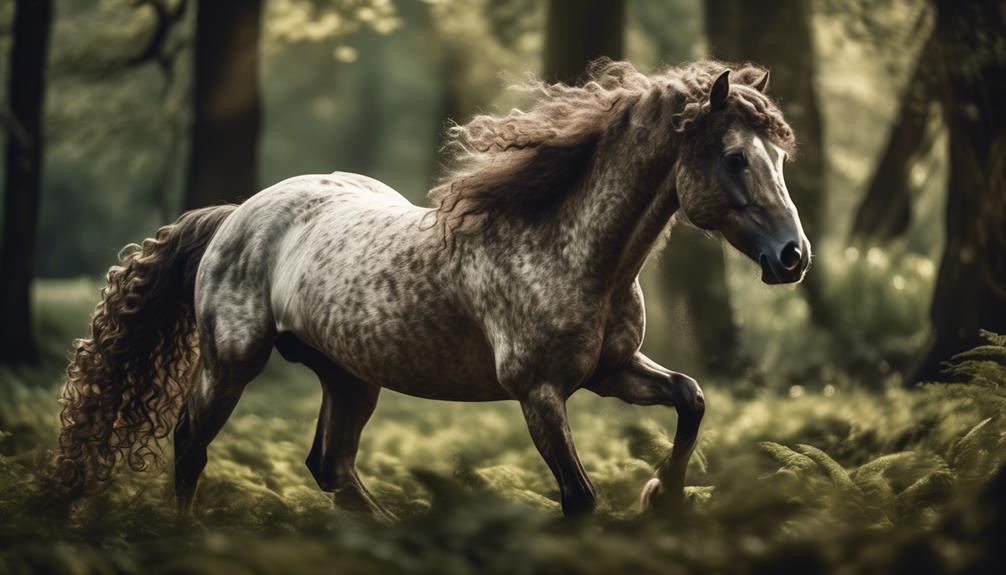
The lifespan of curly horses is approximately 25 years, making them a long-lasting and reliable companion for horse owners, riders, and trainers of all levels. With their even-tempered and calm demeanor, curly horses are suitable for both beginners and experienced individuals.
Their intelligence and easy trainability make them a popular choice among riders and trainers. Whether you're a novice or a seasoned professional, the curly horse is a dependable partner that will be by your side for many years.
Their longevity ensures that you can build a strong and lasting bond with your curly horse, allowing you to experience countless adventures together. So, whether you're looking for a trustworthy mount for leisurely trail rides or a capable competitor in various disciplines, the curly horse is a versatile and enduring choice.
Temperament and Trainability
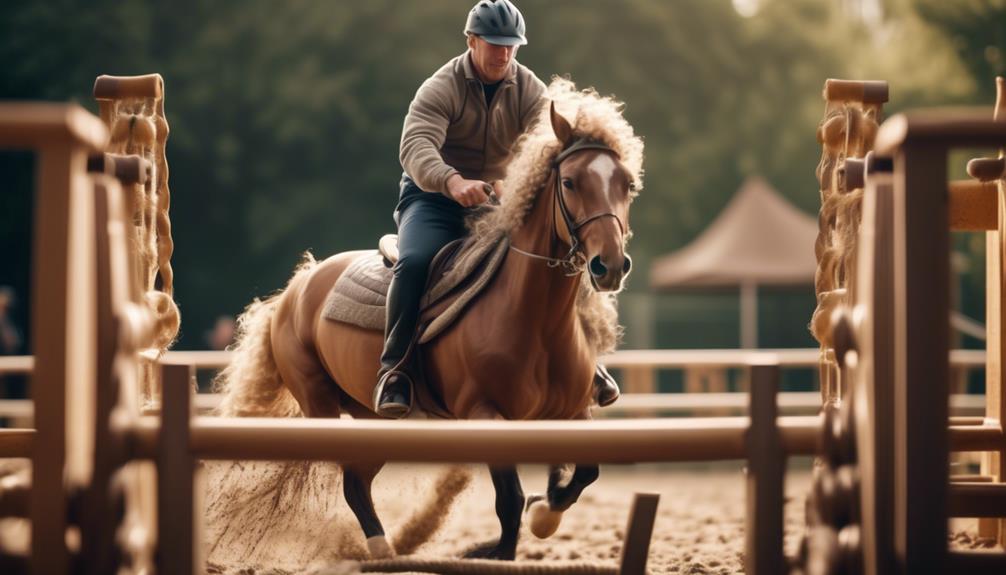
With their even-tempered nature and easy trainability, curly horses make for an ideal partner in any equestrian endeavor. These remarkable equines possess a range of traits that contribute to their exceptional temperament and trainability. Here are five key characteristics that make them stand out:
- Intelligence: Curly horses are highly intelligent, allowing them to quickly understand and respond to training cues.
- Calmness: Known for their calm demeanor, curly horses remain composed even in challenging situations, making them reliable companions.
- Docility: These horses have a gentle and docile nature, making them easy to handle and work with.
- Friendliness: Curly horses are social creatures, displaying a friendly and sociable attitude towards both humans and other animals.
- Adaptability: Whether it's learning new skills or adjusting to different environments, curly horses exhibit a remarkable adaptability that makes them versatile in various disciplines.
Origin Theories
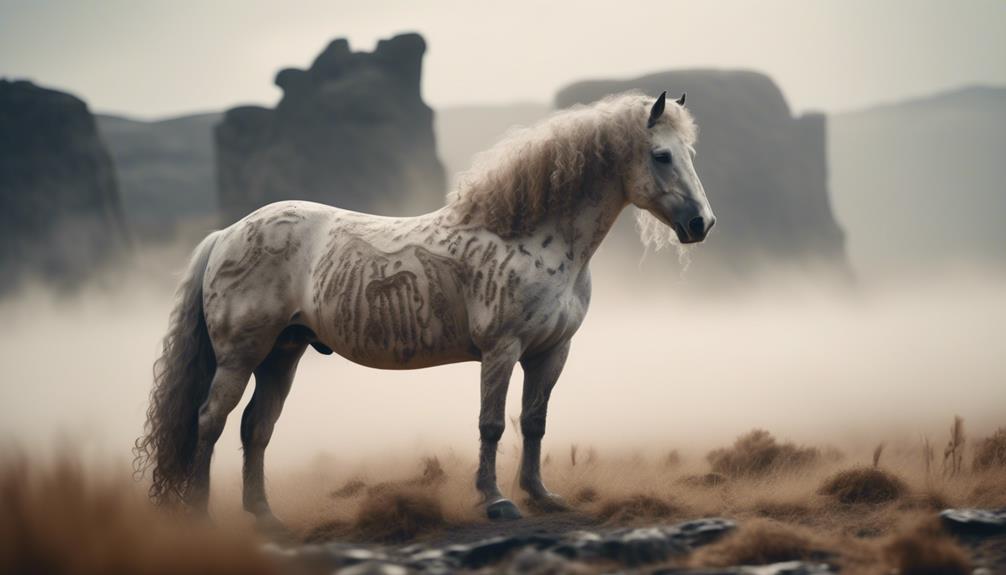
One possible explanation for the origins of the Curly Horse breed is the theory that it was brought by Russian settlers.
According to this theory, Russian settlers who migrated to North America in the 17th and 18th centuries brought their curly-coated horses with them.
These horses, known as Bashkir Curlies, were prized for their unique curly coats and their ability to thrive in harsh climates.
It's believed that the Russian settlers introduced these horses to the Native American tribes they encountered, who then bred them with their own horses.
Over time, a distinct breed emerged, known today as the Curly Horse.
While this theory is plausible, further research and genetic analysis are needed to confirm the true origins of this fascinating breed.
Early Records and Sioux Connection
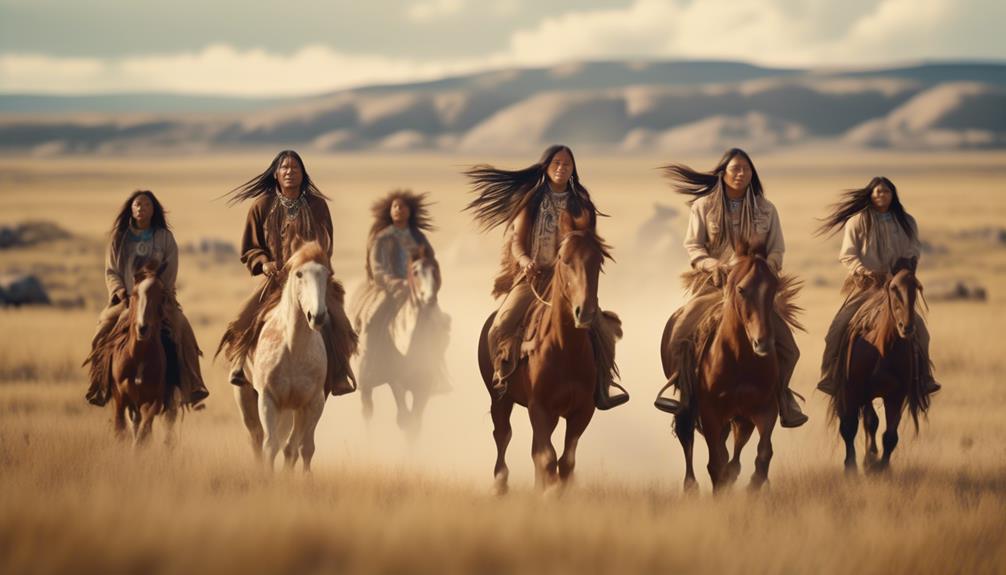
Early records and the Sioux Indians provide valuable insights into the connection between the Curly Horse breed and its fascinating history. These records reveal that Curly horses were depicted in Asian artwork and were owned by the Sioux Indians in the early 1800s.
The Curly Horse breed was introduced in North America when John Damele documented them in Nevada in the early 1900s. A Curly horse found within a herd of Mustangs became the foundation stallion for the breed.
The Curly Horse breed was formally established and registered in 1971. This historical connection between the Curly Horse breed and the Sioux Indians adds to the intrigue and mystery surrounding the breed's origins.
Introduction in North America
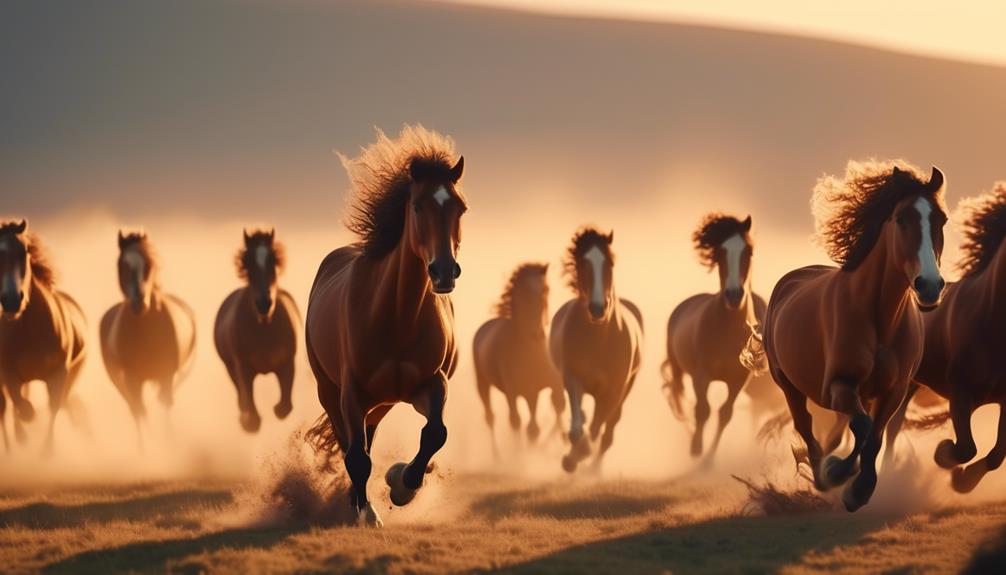
The Curly Horse breed made its way to North America when John Damele documented their presence in Nevada in the early 1900s. It was during this time that Damele discovered a wild herd of horses, among which were several curly-coated individuals. Recognizing the uniqueness of these horses, he began breeding them and promoting their distinct qualities.
The curly horses quickly gained attention for their hypoallergenic coats and friendly temperaments. As word spread, more people became interested in these unique horses, and the breed began to gain popularity.
Today, the Curly Horse breed is well-established in North America, with breeders and enthusiasts dedicated to preserving and promoting this fascinating breed. Whether you're a seasoned horse owner or a beginner, the Curly Horse is sure to capture your heart with its distinctive appearance and gentle disposition.
Foundation Stallion
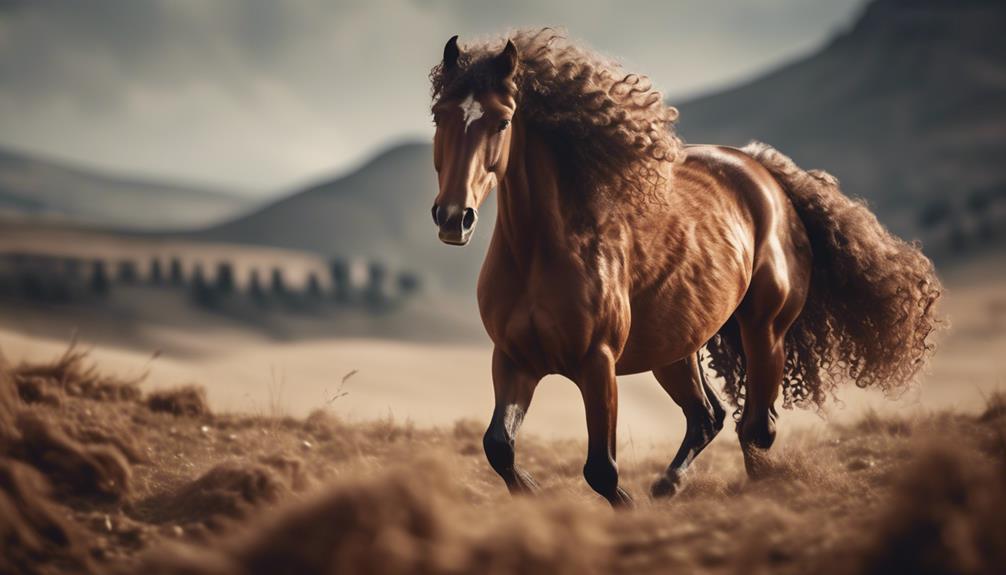
To establish the Curly Horse breed, a wild stallion with a curly coat was discovered within a herd of Mustangs. This foundation stallion played a crucial role in the development of the breed and its unique characteristics.
Here are five important facts about the foundation stallion:
- Origin: The exact origins of the foundation stallion are unknown, adding to the mystery and allure of the Curly Horse breed.
- Coat Type: The stallion possessed a curly coat, which is the defining feature of the breed and sets it apart from other horse breeds.
- Genetic Trait: The curly coat is believed to be a hereditary trait passed down from the foundation stallion to subsequent generations of Curly Horses.
- Adaptability: The stallion's ability to survive and thrive in a wild herd of Mustangs showcased the breed's resilience and adaptability.
- Breeding Success: The foundation stallion's offspring, known as Curly Horses, demonstrated the same curly coat trait, confirming the hereditary nature of the breed.
Through the discovery of this remarkable stallion, the Curly Horse breed was born, captivating horse enthusiasts with its distinctive appearance and fascinating history.
Formal Establishment and Registration
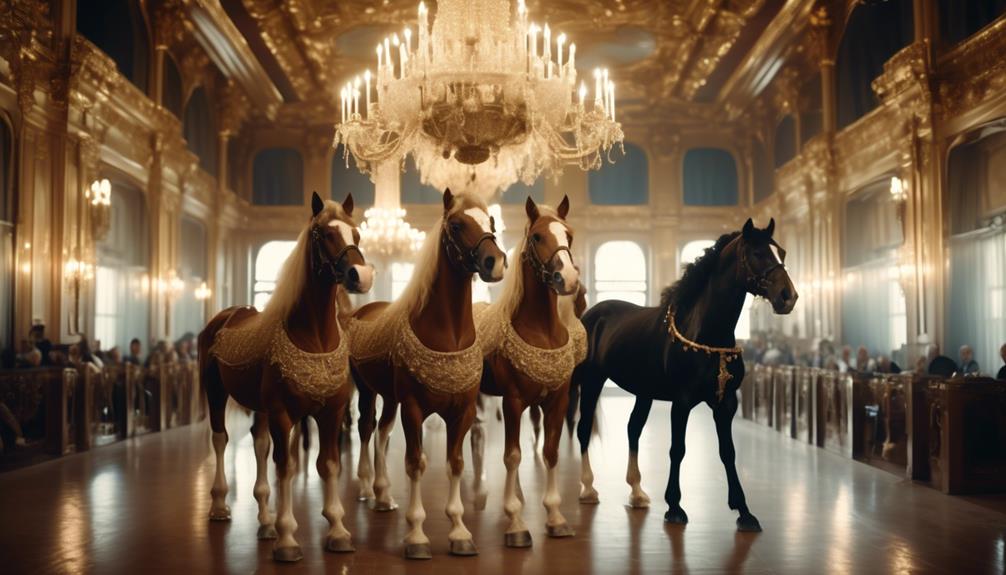
After the discovery of the foundation stallion, the Curly Horse breed went on to achieve formal establishment and registration.
In 1971, the Curly Horse breed was officially recognized and registered as a distinct breed. This marked a significant milestone in the breed's history, solidifying its status and providing a platform for further development and promotion.
The registration process involved documenting the breed's unique characteristics and establishing a set of standards for conformation, temperament, and coat type. This formal recognition allowed breeders and owners to confidently identify and market their horses as purebred Curlies.
It also opened doors for participation in breed-specific competitions and events, further increasing the breed's visibility and popularity.
The formal establishment and registration of the Curly Horse breed provided a strong foundation for its continued growth and preservation.
Social and Friendly Traits
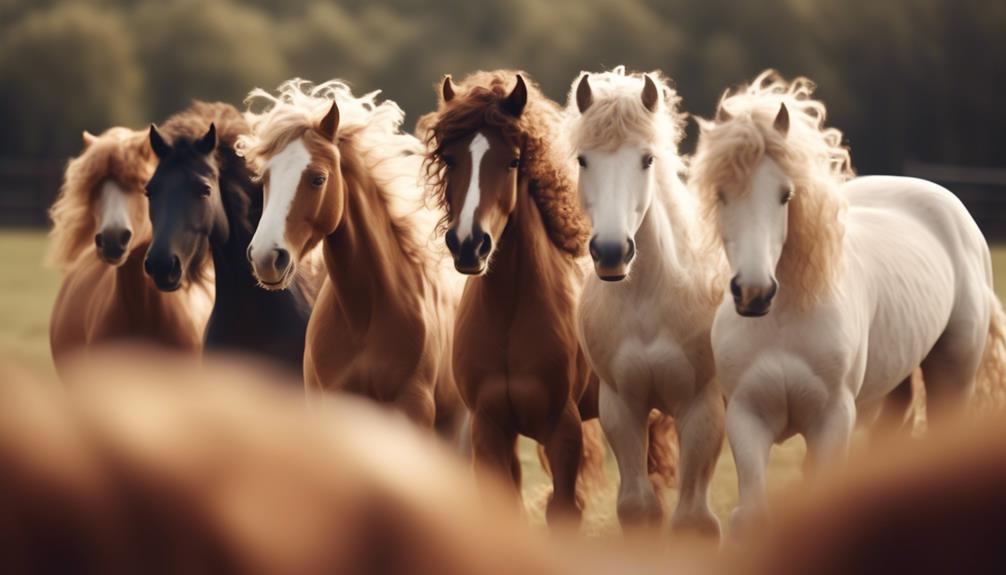
With their social and friendly nature, Curly Horses are known for their excellent temperament and ability to form strong connections with their owners and handlers. These traits make them a popular choice for horse owners, riders, and trainers of all levels.
Here are five reasons why Curly Horses are considered social and friendly:
- They're curious and good-natured, always eager to explore their surroundings and interact with people.
- Their intelligence and easy trainability make them quick learners and responsive to commands.
- Curly Horses have a calm and quiet demeanor, making them suitable for various activities and environments.
- They're known to be reliable and docile, making them dependable partners in various disciplines such as trail riding and therapy work.
- Their social nature allows them to easily bond with their owners and handlers, creating a strong and lasting connection.
Curious and Intelligent Traits
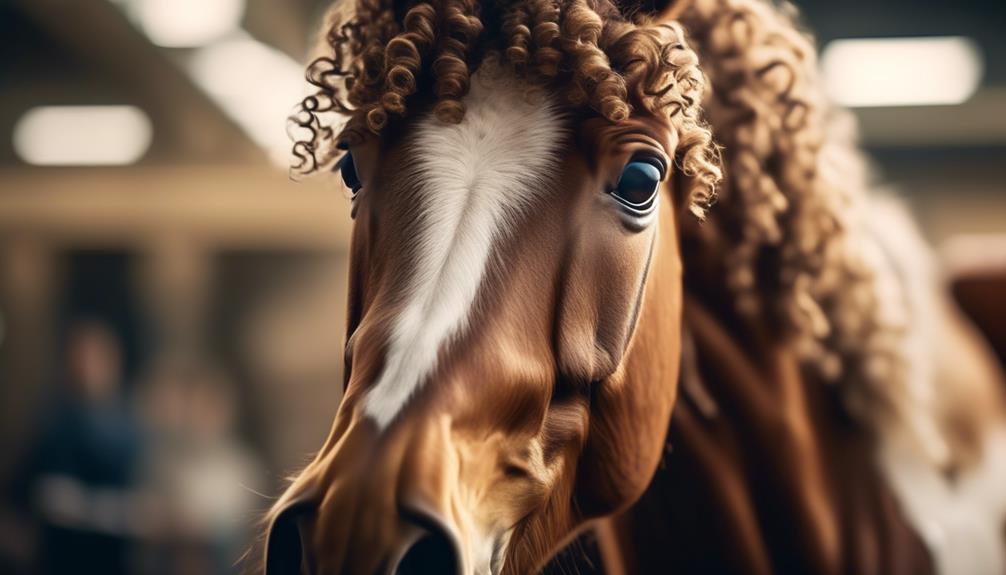
Curly Horses exhibit a natural curiosity and intelligence, making them highly engaging and adaptable companions. Their inquisitive nature drives them to explore their surroundings and interact with their environment. You'll find them investigating new objects and situations with a sense of wonder, always eager to learn and discover.
Their intelligence allows them to quickly grasp new concepts and respond well to training. They're known for their problem-solving abilities and can adapt to different tasks with ease. This combination of curiosity and intelligence makes them not only fascinating to be around but also highly trainable and versatile.
Whether you're looking for a riding partner, a therapy horse, or a working companion, the Curly Horse's curious and intelligent traits make them an excellent choice.
Quiet and Calm Traits
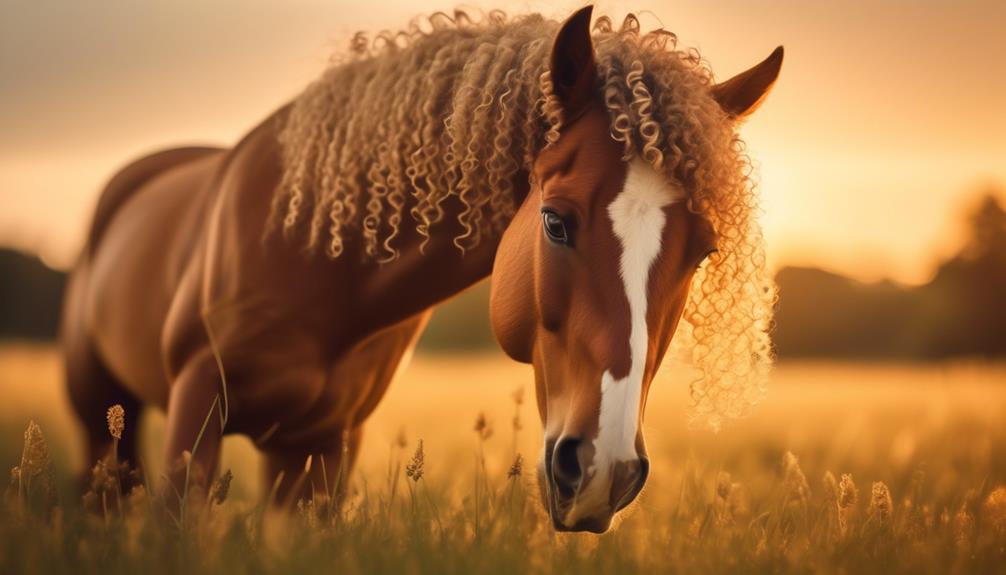
Exhibiting a serene demeanor and a tranquil disposition, the Curly Horse is known for its quiet and calm traits. If you're looking for a horse that will provide a peaceful and relaxed riding experience, the Curly Horse is an excellent choice.
Here are five reasons why this breed stands out for its quiet and calm traits:
- Even-tempered: Curly Horses have a naturally balanced temperament, making them steady and predictable companions.
- Reliable: These horses are known for their consistency and dependability, making them reliable partners in any situation.
- Docile: With their gentle nature, Curly Horses are easy to handle and work with, making them suitable for all levels of riders and trainers.
- Calm: Curly Horses have a natural ability to remain calm, even in potentially stressful situations, making them an ideal choice for riders seeking a peaceful riding experience.
- Quiet: These horses aren't prone to excessive vocalization, making them well-suited for those who prefer a quieter atmosphere during their equestrian activities.
With their quiet and calm traits, Curly Horses provide a soothing and enjoyable riding experience for all.
Overall Description
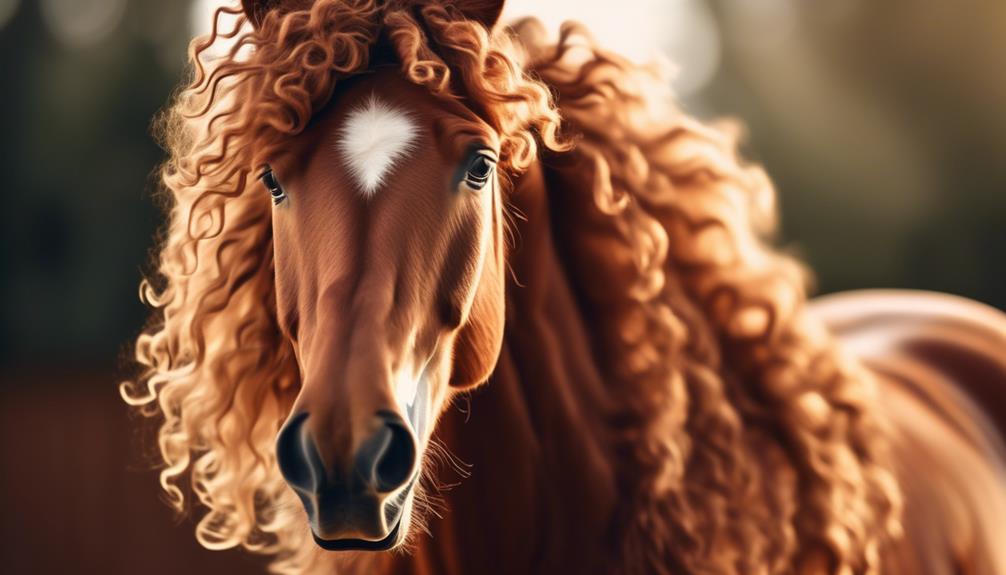
The Curly Horse breed can be easily recognized by its distinctive features and well-balanced physique. Here is an overview of its overall description:
| Feature | Description |
|---|---|
| Head | Medium size with well-defined jaw |
| Neck | Medium length, deep at base where it joins the shoulder |
| Back | Short but deep and strong |
| Eyes | Wide-set with upward-curled eyelashes |
| Ears | Medium or short length with curls on the inside |
The Curly Horse has a solid and well-proportioned body, making it a visually appealing breed. Its medium-sized head with a well-defined jaw adds to its overall charm. The neck is of medium length and deep at the base where it joins the shoulder, giving the horse an elegant appearance. Although the back is short, it is deep and strong, contributing to the breed's overall strength and athleticism. The eyes are wide-set and come with upward-curled eyelashes, enhancing the breed's distinct look. The ears are either medium or short in length and often have curls on the inside. These characteristics combine to create a unique and recognizable appearance for the Curly Horse breed.
Coat Colors and Patterns
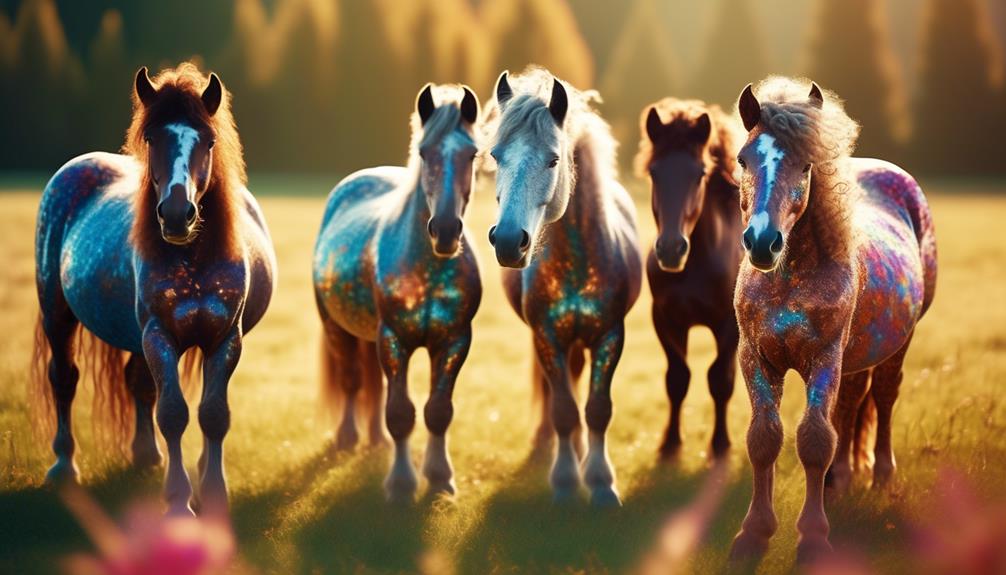
A wide range of coat colors and patterns can be seen in the Curly Horse breed. Here are some of the fascinating variations you may encounter:
- Grullo: A smoky gray coat with a dun gene that gives it a unique appearance.
- Roan: A coat with a mixture of white and colored hairs, creating a beautiful speckled effect.
- Cremello: A pale cream coat with blue eyes, resulting from two copies of the cream gene.
- Buckskin: A golden coat with black points on the mane, tail, and legs.
- Appaloosa: A coat with distinctive spots or speckles, often seen on the hindquarters.
These are just a few examples of the stunning coat colors and patterns that can be found in the Curly Horse breed.
Whether you prefer a solid color or a more intricate pattern, the Curly Horse is sure to captivate you with its unique coat.
Grooming Requirements and Hypoallergenic Potential
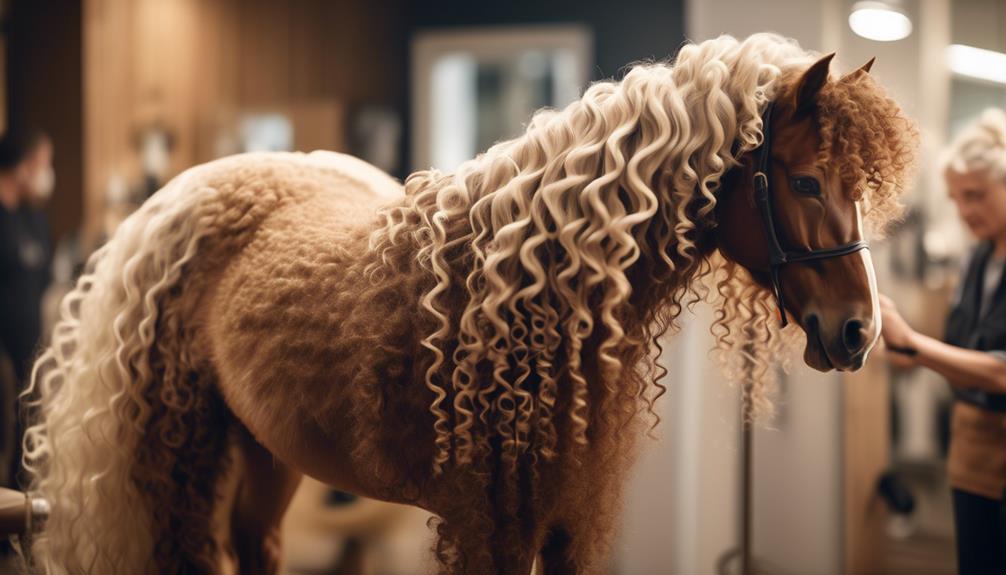
To properly care for a Curly Horse and maintain its unique coat, regular grooming is essential. The curly coat of the Curly Horse can be challenging to groom, but with the right tools and techniques, you can keep it clean and healthy.
Start by using a paddle brush to remove any tangles or knots. Then, use a medium stiff brush to remove dirt and debris from the coat. A shedding blade can be helpful during shedding season to remove loose hair. Use a curry comb to massage the coat and stimulate natural oils. Finish off with a flick brush to add shine.
Additionally, an apple cider vinegar spray can help tame any static in the curly coat.
One interesting potential benefit of the Curly Horse breed is that their hypoallergenic potential. Some people with allergies to horses may find that they've reduced allergic reactions when around Curly Horses.
Frequently Asked Questions
Are Curly Horses Suitable for Competitive Riding and Showing?
Yes, curly horses are suitable for competitive riding and showing. They are intelligent, easy to train, and have a calm temperament. Their solid physique and well-balanced nature make them a great choice for all levels of riders and trainers.
How Do the Theories About the Breed's Origin Affect Its Popularity and Recognition?
Theories about the Curly Horse breed's origin, such as the Russian Bashkir or Bering Land Bridge theories, impact its popularity and recognition. These theories add intrigue and mystery, making the breed more captivating to horse enthusiasts.
Can the Curly Coat of a Curly Horse Be Passed Down to Its Offspring?
Yes, the curly coat of a curly horse can be passed down to its offspring. The curly gene is dominant, so if one parent has a curly coat, there is a high chance the offspring will have one too.
Are Curly Horses More Prone to Any Specific Health Issues or Genetic Conditions?
Curly horses, like any breed, can be prone to certain health issues or genetic conditions. Regular veterinary care, proper nutrition, and exercise can help maintain their overall health and minimize these risks.
Is There a Specific Type of Rider or Discipline That the Curly Horse Breed Excels In?
The curly horse breed excels in a variety of disciplines and is suitable for riders of all levels. Whether you enjoy trail riding, dressage, or jumping, the curly horse's intelligence, calmness, and trainability make them a great choice.
Are Curly Horses Related to the Boulonnais Horse Breed?
Yes, the rare majestic Boulonnais horse breed is thought to be related to the curly horse. Both breeds have similar curly or wavy hair coats, and some experts believe that the curly horse may have originated from the Boulonnais horse breed in Europe.
Conclusion
In conclusion, the Curly Horse breed is a fascinating and enigmatic equine with a rich and mysterious history. From their potential Russian Bashkir roots to their presence in Asian artwork and ownership by the Sioux Indians, the origins of these horses continue to captivate and intrigue.
With their unique coat colors and patterns, quiet and calm temperament, and hypoallergenic potential, the Curly Horse is truly a remarkable breed that has made a lasting impact in the world of horses.

